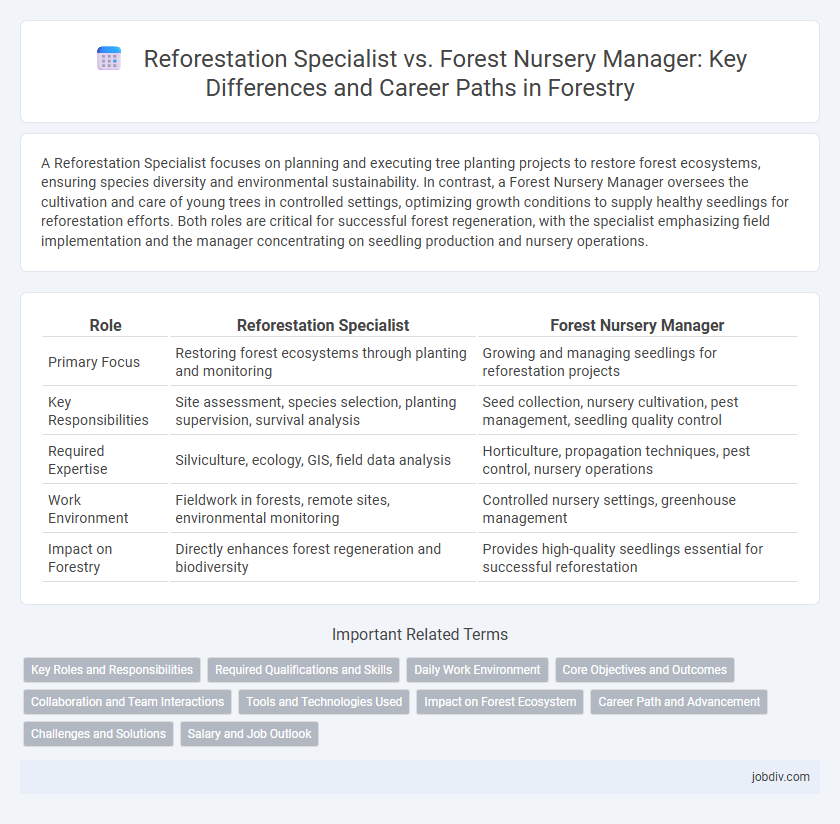A Reforestation Specialist focuses on planning and executing tree planting projects to restore forest ecosystems, ensuring species diversity and environmental sustainability. In contrast, a Forest Nursery Manager oversees the cultivation and care of young trees in controlled settings, optimizing growth conditions to supply healthy seedlings for reforestation efforts. Both roles are critical for successful forest regeneration, with the specialist emphasizing field implementation and the manager concentrating on seedling production and nursery operations.
Table of Comparison
| Role | Reforestation Specialist | Forest Nursery Manager |
|---|---|---|
| Primary Focus | Restoring forest ecosystems through planting and monitoring | Growing and managing seedlings for reforestation projects |
| Key Responsibilities | Site assessment, species selection, planting supervision, survival analysis | Seed collection, nursery cultivation, pest management, seedling quality control |
| Required Expertise | Silviculture, ecology, GIS, field data analysis | Horticulture, propagation techniques, pest control, nursery operations |
| Work Environment | Fieldwork in forests, remote sites, environmental monitoring | Controlled nursery settings, greenhouse management |
| Impact on Forestry | Directly enhances forest regeneration and biodiversity | Provides high-quality seedlings essential for successful reforestation |
Key Roles and Responsibilities
Reforestation Specialists focus on planning and implementing tree planting projects to restore degraded ecosystems, assessing site conditions, and monitoring seedling survival rates to ensure effective forest regeneration. Forest Nursery Managers oversee the propagation, cultivation, and care of tree seedlings within nurseries, managing staff, maintaining nursery inventories, and optimizing growth conditions to produce healthy stock for reforestation efforts. Both roles collaborate closely to ensure the availability of quality seedlings and the successful establishment of forests, but the Specialist emphasizes field activities while the Manager concentrates on nursery operations.
Required Qualifications and Skills
Reforestation Specialists require expertise in ecological restoration, soil science, and GIS mapping to design and implement tree planting projects, along with strong skills in data analysis and field assessment. Forest Nursery Managers need proficiency in plant propagation techniques, pest management, and nursery infrastructure maintenance, combined with experience in inventory control and workforce supervision. Both roles demand strong communication skills and knowledge of environmental regulations, but the Reforestation Specialist focuses more on landscape-level planning while the Nursery Manager prioritizes operational and horticultural management.
Daily Work Environment
A Reforestation Specialist spends most of their day in the field, conducting site assessments, planting trees, and monitoring reforestation projects to ensure ecosystem restoration goals are met. In contrast, a Forest Nursery Manager works primarily in controlled nursery environments, overseeing seedling propagation, managing nursery staff, and maintaining optimal growing conditions for young plants. Both roles require detailed knowledge of forestry practices but differ significantly in their hands-on settings and operational focus.
Core Objectives and Outcomes
Reforestation Specialists prioritize restoring ecosystems by planning and implementing tree planting projects that enhance biodiversity and combat climate change. Forest Nursery Managers concentrate on cultivating healthy seedlings, optimizing growth conditions, and ensuring a steady supply of quality plants for reforestation efforts. Both roles collaborate to achieve sustainable forest regeneration, balancing ecological resilience with operational efficiency.
Collaboration and Team Interactions
Reforestation Specialists and Forest Nursery Managers collaborate closely to ensure successful tree planting and growth, combining expertise in site assessment and seedling cultivation. Their team interactions focus on aligning nursery production schedules with reforestation project timelines to optimize sapling availability and survival rates. Effective communication between these roles enhances adaptive management strategies, promoting ecosystem restoration and sustainable forest management.
Tools and Technologies Used
Reforestation Specialists utilize GIS mapping software, drone technology, and soil analysis tools to plan and monitor tree planting and ecosystem restoration projects. Forest Nursery Managers focus on greenhouse automation systems, seed processing equipment, and irrigation technology to optimize seedling growth and nursery production. Both roles rely on data management platforms and environmental monitoring devices to ensure sustainable forest regeneration.
Impact on Forest Ecosystem
Reforestation specialists directly influence forest ecosystem restoration by selecting native species and implementing planting techniques that enhance biodiversity and soil stability. Forest nursery managers contribute by cultivating high-quality, genetically diverse seedlings that ensure the success of reforestation efforts and long-term forest resilience. Both roles are critical for maintaining ecosystem health, promoting carbon sequestration, and supporting wildlife habitats.
Career Path and Advancement
Reforestation Specialists focus on planning and implementing tree planting projects to restore degraded ecosystems, often requiring expertise in ecology and GIS technology, leading to advancement into roles such as Forest Restoration Coordinator or Environmental Project Manager. Forest Nursery Managers oversee the propagation and cultivation of tree seedlings, emphasizing horticulture skills and nursery logistics, with career growth opportunities into Senior Nursery Operations or Plant Production Director positions. Both careers offer pathways to leadership in forestry conservation, with Reforestation Specialists typically advancing through field project management, while Nursery Managers progress via operational excellence and production management.
Challenges and Solutions
Reforestation specialists face challenges such as ensuring species diversity and adapting to climate change impacts, often implementing site-specific planting techniques and monitoring protocols to enhance forest resilience. Forest nursery managers encounter difficulties in seed quality control, pest management, and optimizing growth conditions, utilizing advanced horticultural practices and integrated pest management systems to ensure healthy seedling production. Both roles require coordinated efforts to align nursery stock with reforestation goals, emphasizing sustainable practices and technological innovation to overcome ecological and operational obstacles.
Salary and Job Outlook
Reforestation specialists earn an average salary of $50,000 to $70,000 annually, with job growth driven by increasing environmental restoration projects and climate change mitigation efforts. Forest nursery managers typically earn between $55,000 and $75,000, benefiting from steady demand in commercial seedling production to support reforestation and sustainable forestry programs. Both roles experience a positive job outlook, though nursery managers may find more stability in long-term employment due to ongoing seedling cultivation needs.
Reforestation Specialist vs Forest Nursery Manager Infographic

 jobdiv.com
jobdiv.com